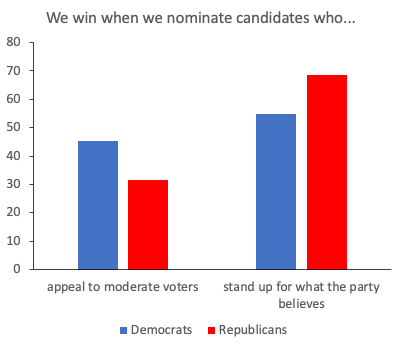Electability and human nature across party lines
Some differences among Democrats and Republicans in a recent survey
In my August survey of Democratic and Republican county chairs, I asked several general questions about political perceptions. I was interested in understanding if there are basic features of US politics that are perceived differently across party lines. Specifically, I asked them about the importance of electability, the cooperativeness of humans, and the educational value of recent election losses.
A persistent question throughout my recent research has been the idea of “electability.” That is, partisan actors clearly want their chosen nominees to win general elections, but their concern over just how much to rank electability over other priorities (and even their confidence in identifying the more electable candidate) can vary across parties and time periods. Democrats were famously fixated on electability in the 2020 nomination cycle, which provided a substantial boost to Joe Biden’s candidacy. Yet this may be a particular Democratic obsession, and possibly conflated with perceptions and concerns about women candidates and candidates of color.
To assess differences across parties, I asked the chairs whether they think their party wins when it nominates candidates who:
a) appeal to moderate voters, or
b) stand up for what the party believes in.
Both sets of partisans seem to prefer those who stand up for party beliefs, but for Democrats, that is only a marginal difference of 55 to 45. For Republicans, the advantage for standing up for party beliefs was an overwhelming 68 to 32. As with other surveys, this suggests that Democrats prize the concept of electability more than Republicans do, although whether this is because of denial about Trump’s loss in 2020, because Trump was repeatedly portrayed as unelectable in 2016 right up until his election, or something else remains undetermined.
The chairs were also asked to appraise human nature. Using question language derived from various psychological surveys, subjects were asked whether people were basically a) self-serving and uncooperative, or b) sympathetic and cooperative.
You’ll want to read the rest of this. And you can, for a mere $8/month! Please consider subscribing.
Keep reading with a 7-day free trial
Subscribe to Tusk to keep reading this post and get 7 days of free access to the full post archives.






